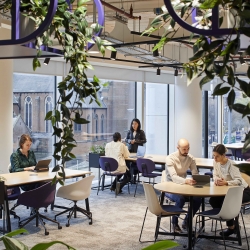November 29, 2023
One year on from generative AI hype, people are scared and excited about its use
 Nearly one year after ChatGPT burst into the public consciousness, generative AI (GenAI) has left employees and their organisations both excited and uneasy. According to a recent study [registration] commissioned by Betterworks and conducted by Propeller Insights, over half of employees are using GenAI at work for complex activities and believe it has the potential to reduce bias across a swath of HR processes, despite the fact that only 41 percent of organisations are actively evaluating it or have made GenAI a priority. At the same time, many employees are concerned about the potential impact of GenAI on both their roles and the possibility of unintentional amplification of bias. (more…)
Nearly one year after ChatGPT burst into the public consciousness, generative AI (GenAI) has left employees and their organisations both excited and uneasy. According to a recent study [registration] commissioned by Betterworks and conducted by Propeller Insights, over half of employees are using GenAI at work for complex activities and believe it has the potential to reduce bias across a swath of HR processes, despite the fact that only 41 percent of organisations are actively evaluating it or have made GenAI a priority. At the same time, many employees are concerned about the potential impact of GenAI on both their roles and the possibility of unintentional amplification of bias. (more…)















 The CIPD has welcomed a new consultation from the UK Government on making flexible working requests a day one right. The CIPD launched its #FlexFrom1st campaign in February, calling for all employees to have the immediate right to request flexible working. Under the proposed legislation, companies would be obliged to explain their reasons if it is then refused. The plan would also oblige employers to respond to such requests more quickly, and is being billed as a major reshaping of the way people work in a post-pandemic world, making flexible work the default.
The CIPD has welcomed a new consultation from the UK Government on making flexible working requests a day one right. The CIPD launched its #FlexFrom1st campaign in February, calling for all employees to have the immediate right to request flexible working. Under the proposed legislation, companies would be obliged to explain their reasons if it is then refused. The plan would also oblige employers to respond to such requests more quickly, and is being billed as a major reshaping of the way people work in a post-pandemic world, making flexible work the default. 
 Employers are failing to identify and tackle potential age bias in their recruitment process, with most employers interviewed not seeing it as a ‘problem’ in their organisation, according to a new report by the
Employers are failing to identify and tackle potential age bias in their recruitment process, with most employers interviewed not seeing it as a ‘problem’ in their organisation, according to a new report by the 
 In the
In the 














